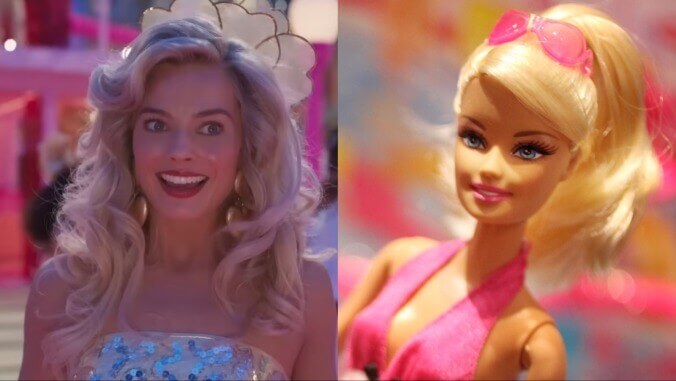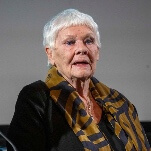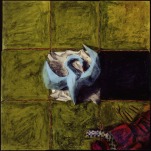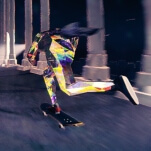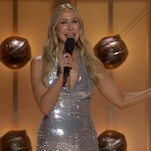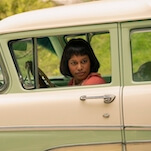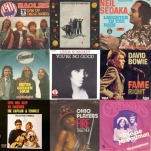Left: Margot Robbie in Barbie (Screenshot: Warner Bros.) Right: Barbie: (Oli Scarff/Getty Images)
When we think of the Oscars’ Best Adapted Screenplay award, our minds typically drift to the world of books. With a few exceptions—short films, plays, the occasional magazine article—Best Adapted Screenplays have largely been culled from the world of novels, memoirs, and the occasional non-fiction piece; the adaptation in question almost always coming from one act of writing into the world of another, i.e., cinematic screenplays.
Which is why it’s interesting to learn this week that Greta Gerwig and Noah Baumbach’s script for their summer blockbuster Barbie will also be competing in the category at this year’s Academy Awards, since Gerwig and Baumbach adapted the film from, well… Barbie. As in, the doll.
Now, this slightly odd decision is not completely unprecedented—Christopher Miller chimed in on social media today to note that his and Phil Lord’s 2014 screenplay for The Lego Movie was similarly deemed an “adaptation” of plastic because it was based on Lego—and “based on existing characters” is a somewhat regular criteria for inclusion in the category. (Last year, both Glass Onion and Top Gun: Maverick were nominated for Best Adapted Screenplay because they were sequels “based on” existing characters.) But Gerwig and Baumbach clearly disagreed, since they reportedly campaigned for the film for Best Original Screenplay. The Writers Guild Of America recognized the script as an original for its own upcoming awards, but the Writers Group of the Academy handed their own judgment down today, dubbing it an adaptation.
Thinking about the film, we can kind of understand both sides: Gerwig’s movie is largely concerned with coming to terms with an existing character’s position in the world; the film couldn’t really work in the same way if it was based on a fictional doll without a multi-decade history to draw upon. On the other hand, Gerwig and Baumbach’s Barbie script has almost nothing to do with any other piece of written material, give or take ad copy on the back of doll boxes; you can’t really fault them for suggesting their film isn’t adapting anything except the culture it was produced in, and that basically applies to every script ever written.
Anyway, the move will likely shift fortunes in both of the affected categories. Best Original Screenplay will now see more vigorous fights between films like The Holdovers, May December, and Cannes winner Anatomy Of A Fall; Barbie, meanwhile, will be running against Martin Scoresese’s Killers Of The Flower Moon—and, perhaps inevitably, Christopher Nolan’s Oppenheimer.
[via Variety]
